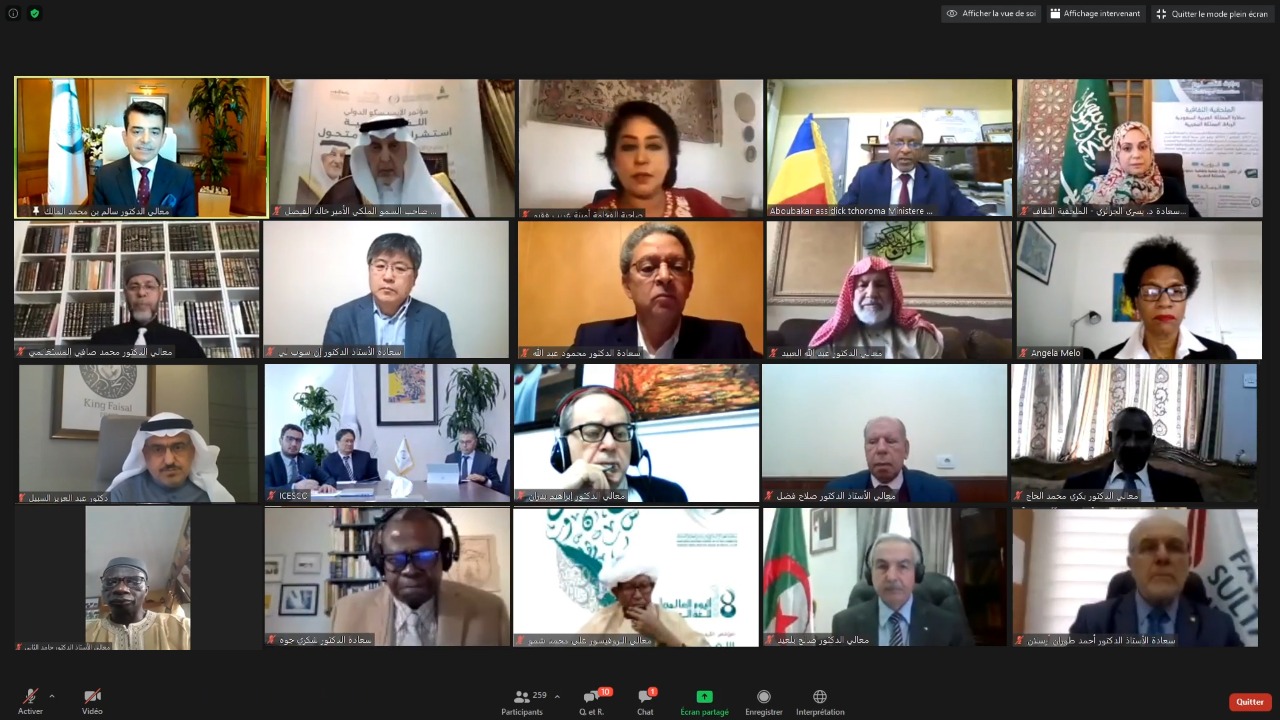
ICESCO Major International Conference in Observance of World Arabic Language Day Concludes its Proceedings

22 December 2020
The celebration of the Islamic World Educational, Scientific, and Cultural Organization (ICESCO) concluded its proceedings, following deliberations and presentations on the future of the Arabic language. High-profile participation marked the celebration, which lasted for more than four hours.
H.R.H. Prince Khalid Al-Faisal bin Abdulaziz Al Saud honored the celebration with his attendance and delivered the opening address. H.E. Prof. Ameenah Gurib-Fakim, Former President of Mauritius; Mr. Aboubakar Siddick Choroma, Minister of National Education and Civic Promotion of Chad; and Dr. Ali Mohamed Shumo, Former Minister of Culture and Information of Sudan, also took part in the opening ceremony.
ICESCO held the major celebration in observance of the World Arabic Language Day, yesterday, December 21, via videoconferencing. The Organization cooperated with King Abdulaziz University in Saudi Arabia, the Cultural Attaché Office at the Embassy of Saudi Arabia in Rabat, the Regional UNESCO Office in Rabat, and Al-Akhawayn University in Morocco.
H.R.H. Prince Khalid Al-Faisal bin Abdulaziz Al Saud gave the opening address, as the Conference’s most revered guest. Dr. Salim M. AlMalik, ICESCO Director-General (DG) then moderated the opening session, during which he read a poem he authored, titled “The Richness of Arabic.” The opening session also featured the addresses of H.E. Prof. Ameenah Gurib-Fakim, who highlighted the great value of the Arabic Language within and beyond its social circles, calling for rethinking our approach to languages in general, as many are on the verge of extinction and taking away cultural treasures with them.
Mr. Aboubakar Siddick Choroma, Minister of National Education and Civic Promotion of Chad called for using the modern digital revolution in the field of Arabic teaching. Ms. Angela Melo then gave the address on behalf of the UNESCO DG, who underscored that protecting languages is a shared responsibility. Dr. Ali Mohamed Shumo stated that millions of Muslims speak Arabic, given that it is the language of the Holy Quran and the Sunnah.
The conference, held under the theme “Arabic Language: Foresight in a Changing World,” featured five working sessions. Dr. Abdulah Al-Ubaid, Honorary President of ICESCO Center of Arabic for non-Arabic Speakers, moderated the first session on the future roles of academic institutions in promoting Arabic.
Dr. Yussra bint Hussain Al-Jazairi, Cultural Attaché of Saudi Arabia in Rabat, moderated the second session on the future of the Arabic language in educational systems. Dr. Abdulilah Benarafa, Cultural Advisor to ICESCO DG, moderated the third session that focused on the opportunities of the Arabic language in the era of the fourth industrial revolution. Mr. Adil Bouraoui, Advisor to ICESCO DG for Arabic Language Centers Abroad and Academic Chairs, moderated the fourth session, which discussed the topic of digital applications in aid of the Arabic language. Dr. Majdi bin Hajji Ibrahim, Head of ICESCO Center of Arabic for non-Arabic Speakers, chaired the fifth session, which focused on the topic of “Arabic language academies: an absolute necessity.”
At the close of the ceremony, ICESCO DG expressed his thanks and appreciation to the guests of honor, all participants, and cooperating institutions for accepting ICESCO’s invitation, reaffirming that the Organization undertakes to give all proposals, recommendations, and visions set forth during the Conference the due attention they deserve.





